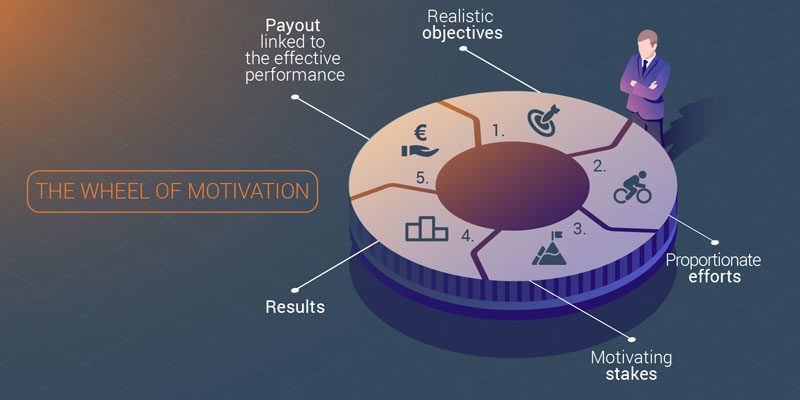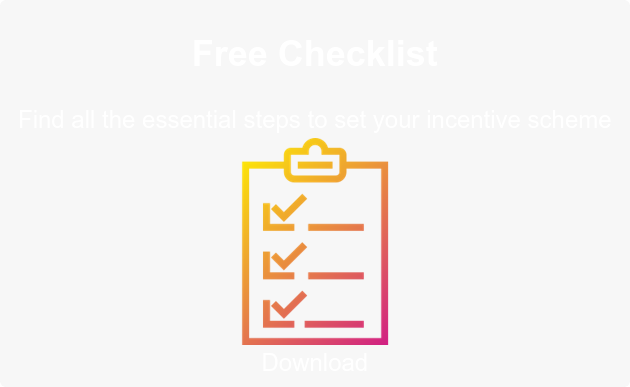These are the five essential steps that will make your sales staff into highly motivated and high-performing employees - provided that your icentive system is reliable and well-delivered.
The “carrot and stick” approach is not enough on its own to motivate your employees. Truth be told, money isn’t the only thing in life, even for sales people. As such, managers who are convinced that the lure of a huge jackpot will be enough to get teams into the starting blocks often find themselves sorely mistaken.
Make no mistake - successfully motivating your staff is no easy matter. When a company draws up its bonus scheme, it is issuing a performance requirement to which a financial incentive is attached. But if we are to avoid a common misconception, we must remember that although financial compensation can create motivation, it is not the only tool capable of spurring performance. The role of managers is essential, as are training, marketing tools, etc.
These are the 5 essential steps your sales staff will go through as they weigh up how motivated they feel by your bonus scheme. Each are key factors you can tweak and emphasise in order to incentivise your teams to achieve their goals:
1. Realistic objectives in order to avoid demotivation from the get-go
Your targets should always be ambitious, but to remain motivational, they must above all be realistic. The first thing that a sales person will assess is the feasibility of the challenge you have set for them. Neither the team dynamic nor your natural leadership/ability to communicate the company’s strategic vision will change this.
Imagine that you just took up jogging two weeks ago, and then someone suggested you run a marathon. You wouldn’t feel ready - and you’d be right. You would evaluate your slim chances of success and decide that it’s best not to try. If the bar is set too high - if your target is deemed unattainable - you’re at risk of de-motivating your teams. If a sales agent doesn’t want to get in the race it’s because they simply don’t see the point.
2. Proportionate effort: carefully adjusting the balance between effort and reward
Your sales agent will then assess the level of effort they need to make in order to achieve the objectives you have set. They will translate this into the number of hours they’ll need to work, overtime required, travel, involvement, and tiredness. If they consider the effort to be too great, and disproportionate to the potential bonus on offer, they probably won’t bother to start the race.
3. Balanced objectives for a variable pay scheme that is both stable and reversible
In order to ensure the juice is worth the squeeze, the bonus being sought has to be sufficiently enticing. In order to stimulate motivation among your sales staff, this means being neither too low nor too high, with the possibility of varying from one period to another (or even ceasing to exist if targets are not achieved). This reversible aspect of variable pay has the advantage of increasing motivation levels, as the employee’s overall salary is closely linked to the achievement of their objectives.
The key is to succeed in combining the reversibility of the compensation package with a minimum level of salary stability, in order to create a positive working dynamic. Your compensation plan will need to set a healthy ratio of fixed salary to variable pay.
4. Results that match a clearly-defined objective
Sometimes there can be a gap between the bonus the sales person thinks they’ll earn and the reality. This is most often due to the way in which your compensation plan is designed: the choice of performance indicators has a direct impact on the way in which bonuses are paid out, and therefore on your employees’ motivation levels.
For example, this type of issue can be caused by billing delays (the sales agent thinks they’ve hit their target, but one of their sales won’t be billed until the next performance cycle). The bonus criteria might also be difficult in accounting terms - for example, a bonus issued for new customers.
5. Value that matches the sale agents calculations
Finally, your sales agent will check to see if the value of their bonus matches what they were initially told it would be. Communication is the watchword here: it’s important to clearly indicate the link between the bonus scheme being used and the overall commercial strategy, as well as the motivational tactics you’re aiming for. A poorly-understood bonus scheme will be ineffective. Providing web-based solutions for each sales agent, giving them regular information updates on their situation, and allowing them to simulate their bonuses based on their own personal performance estimates, will have a major effect on getting staff on board with the bonus scheme and incentivising them to act.





